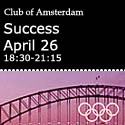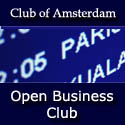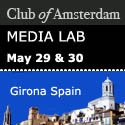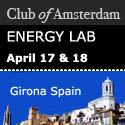
Content
Welcome to the Club of Amsterdam Journal. ” All you need in this life is ignorance and confidence, and then success is sure.” – Mark Twain “I dread success. To have succeeded is to have finished one’s business on earth, like the male spider, who is killed by the female the moment he has succeeded in his courtship. I like a state of continual becoming, with a goal in front and not behind.” – George Bernard Shaw “When you get out of bed in the morning and think about what you want to do that day, ask yourself whether you’d like others to read about it on the front page of tomorrow’s newspaper. You’ll probably do things a little differently if you keep that in mind.” – Warren Buffett Felix Bopp, editor-in-chief Join our next Season Event about the future of Success on April 26.: And check out our labs in Girona near Barcelona: LAB on Old and New ENERGY – April 17&18 LAB on MEDIA and Human Experience – May 29&30 |
Turning Your Wishes Into Reality
 | Nisandeh Neta, Founder, Open Circles Academy about his book Elements of Success Nisendeh is a presenter at our next Season Event about the future of Success |
| What does being successful mean to you? Does it mean being financially set for life… having loving, nurturing relationships with your partner, family and friends… finding spiritual fulfillment? We may all have different ideas of what success is but there’s one thing we all agree on – we want it!Yet for many of us, success remains elusive.If only success was something you could view as tangible: something you could take off a shelf and make happen…Now you can. Take a moment and imagine that life is a well-appointed kitchen. All of the appliances and tools are in place. Every ingredient you need is at hand. You can cook absolutely anything you desire.All you need are a few simple recipes.Elements of Success, a new home-study course invites you into the “kitchen” where you’ll discover how to create the life you’ve always wanted. More than simply a how-to course, the easy-to-follow, 200-page hands-on book and CD set puts you directly in the mix as you apply all that you learn towards making your life truly successful.Elements of Success leads you step-by-step through:The myths and mistakes that hinder success. Learn to identify personal pitfalls that have blocked your success in the past and discover how to overcome them. The power of the mind. Every result in life starts as a thought. Elements of Success teaches you how to use your mind to focus energy on attracting any result you wish for. The importance of taking personal responsibility for your actions and thoughts. Find out how to move out of the victim role and reclaim your power as a creator. The power of visualization in creating reality. Learn precise and powerful techniques for manifesting your dreams into reality, receiving answers to life questions and more. The power of acknowledgement and completion. This rarely talked about secret, when used the right way, puts you in a positive spiral. You will get more and more energized with each result you create. What failure really is. As soon as you understand the true meaning of failure, all of the negative connotations and feelings you attach to not getting the result you planned will disappear. How to create instant results by moving beyond barriers of beliefs. Elements of Success offers three simple ways to move beyond what you believe is impossible to create instant transformation. The difference between “wanting” something and “being willing to have” it. Learn the difference between the passive, childish position of “I want chocolate! I want! I want!” and the mature, active, willing position of “I am willing to do whatever it takes, to let go of whatever is not supporting me and to become whoever I need to be in order to fulfill my potential.”And so much more …Elements of Success is divided into three easy-to-digest parts. The first part, Prepping the Kitchen, gets success chefs ready for the creative process. It reveals why the mind is your most important tool and demonstrates how to keep it sharp and ready to carve out success.Once the kitchen has been prepared, you are ready to begin creating success. In the second part of the book, Cooking Success, the SPICE creative cycle is explained. Each creative cycle is made up of these elements: Source Picture Implementation Consequence and Enrichment. SPICE describes how you’ve created success in the past and what you need to do to create success in the future in any area of your life.SPICE begins with a Source. The source is the inspiration that kicks off the whole creative cycle — the fire that heats the oven.Once inspiration has taken hold, you begin to feed the fire and allow the heat to build. You start to Picture what you want to achieve. You begin to see what success will look like, to savor what it will smell like, to imagine what it will taste like.Once the excitement and enthusiasm take hold, you’re ready to take action – to actually put the ingredients together and Implement your ideas. Your action, in turn, will lead to a Consequence, the result of what you have chosen to create and how you have prepared it.Of course, not every consequence will be the exact one you planned. When you achieve a goal only to realize it’s not what you want, you can either learn a lesson from it, or begin making changes to Enrich the result you’ve created until it’s closer to the one you expected.That enrichment process is often the start of a whole new creative cycle.The heart of the book is in the third part, Serving The Meal. Here, you will “attend” a powerful yet simple six-week hands-on “cooking school,” on two CDs, that will lead you from simply wishing for success to ultimate satisfaction.The techniques on the CDs will help you alter your conscious and unconscious mental patterns, allowing you to rise above current limitations to achieve your longed-for goals. As a finishing touch, the book also includes proven techniques for both relaxation and reinvigoration, and special “success recipes” geared towards different results. You can find the book click here |
Info.nl is the supporter of our next event about the future of Success |
Energy LAB
| LAB on Old and New ENERGY An immersed experience of a Do-Tank April 17 & 18, 2007 Location: Girona near Barcelona, Spain Max. 20 Delegates Moderated by Humberto Schwab, Director, Club of Amsterdam, Innovation Philosopher and the Thought Leaders Nathalie Horbach, Centre for Energy, Petroleum and Mineral Law and Policy, University of Dundee Nuclear policies specialist Simon Taylor, Director and Co-Founder, Global Witness Environmental issues Christof van Agt, International Energy Agency Sustainable energy specialist Paul Holister, Nanotechnology & Energy |
News about the future of Success

Positive Psychology News Daily
The Positive Psychology News website is authored by graduates of the MAPP (Master of Applied Positive Psychology) program at UPenn.
Positive Psychology News writes about psychology, sociology, neurobiology, computer science, and positive psychology.

by Joe Love
Business knowledge and skills are not the only keys to success. To be successful, you also need to master the psychological skills that will help you to be satisfied and fulfilled, and thus more effective in your work. Knowing how to manage your mind, and understanding how to deal with lack of confidence, stress, anxiety, and depression, is as important as knowing how to handle the strategic and organizational challenges of your business.
Success means being fair to yourself and to others. You must learn to be assertive but fair. Assertiveness is based on the idea that your needs, wants, and feelings are neither more nor less important than those of other people. You have the right to make claims for yourself clearly and honestly, as long as those claims don’t impinge on the rights of others.[…]
Club of Amsterdam blog
 | Club of Amsterdam blog http://clubofamsterdam.blogspot.com April 4: Lifestyle and New Media March 20: The Future of the Web March 13: “We Media” March 05: Climate and Energy Provision February 27: The future of Nuclear Energy February 21: Nanotechnology & Energy February 12: Innovation – a hybrid connection between old practices? |
News about the Future

The future of books
by the Economist
In secret locations and using secret methods, human beings are scanning lots and lots of books for Google, the world’s largest web-search company.
Google will not divulge exact numbers, but Daniel Clancy, the project’s lead engineer, gives enough guidance for an educated guess: Google’s contract with one university library, Berkeley’s, stipulates that it must digitise 3,000 books a day. […]
What about all the genres of books that fill a different human need? Certainly, some types of fiction–novels as well as novellas–are also likely to migrate online and to cease being books. Many fantasy fans, for example, have already put aside books and logged on to “virtual worlds” such as “World of Warcraft”, in which muscular heroes and heroines get together to slay dragons and such like. Sciencefiction may go the same way, and is arguably already being created by “residents” of online worlds such as Second Life. […]
But even anthologies of short stories and poems, like longer novels, are unlikely to disappear. People want to be guided by others. They also want media suitable for unhurried reading in beds and bathtubs and on beaches. Above all, they wantpaper books for what digitisation is revealing them to be. Books are not primarilyartefacts, nor necessarily vehicles for ideas. Rather, as Seth Godin – a blogger and author of eight books on marketing – puts it, they are “souvenirs of the way we felt” when we read something. That is something that people are likely to go on buying.

Assistive robot adapts to people and new places
MIT researchers are working on a very early version of an intelligent, robotic helper – a humanoid called Domo who grasps objects and places them on shelves or counters.
A robot like Domo could help elderly or wheelchair-bound people with simple household tasks like putting away dishes. Other potential applications include agriculture, space travel and assisting workers on an assembly line, says Aaron Edsinger, an MIT postdoctoral associate who has been working on Domo for the last three years.There are now plenty of robots doing manual work on factory assembly lines, but those machines follow a script and can’t learn to adapt to new situations, as Domo can, said Rodney Brooks, director of MIT’s
Computer Science and Artificial Intelligence Laboratory.
Lifestyle and New Media
 | Q&A with Laurence Desarzens, urban communicator, beatmap.com Media & communication specialist for lifestyle companies Laurence is a Thought Leader in the LAB on MEDIA and Human Experience An immersed experience of a Do-Tank May 29 & 30, 2007 Location: Girona near Barcelona, Spain |
Club of Amsterdam: Laurence – you are in close touch with youth culture – this from a cultural as well as commercial involvement. Lifestyle is more and more the defining factor for new media. Can you give us some examples how young “urban tribes” are dealing with communication and media at large?
First I think we should talk once about the definition of what is “youth” today. Maybe “youth” is less related to an age group and more to a lifestyle. Keeping this in mind … Using new media (which essentially are tools) need time, that’s certainly why it influence your lifestyle. And for sure if you are using these tools you keep in contact to your network and group. That’s what allows you to learn, share and exchange, work, be cool ;). You use mobile, internet, constantly and everywhere, you communicate constantly. So everything influences everything to give birth to colourful, and creative trends in all fields, who constantly evolve. These trends can also be scary and dark off course. It’s the people and not the media who are defining the content. Or is it really 😉
Youth tribes fluidly use all means of new technologies to surf what can be of their very specific interests NOW. They double-check validity, relevance and credibility with their friends faster than the speed of light. They copy, they fake, because the tools are theirs to do so, and why not. They use what is the most convenient for them to communicate … internet, gsm, whatever.
You will see website about specific cultures interests: skate, sneaker culture, music, who can bloom in a very short time. You see trends come, go and come back, and mutate. If you take people in hip hop music, you have young producers doing beats, exchanging and working cross borders. Influenced by anything. So they use all these tools whatever they are … AIM, Skype you name it.
In hip hop and really in all subcultures it’s simply amazing to see all these mosaic of ideas, tastes and styles developing and exchanging via new media. If main media are not interested they create their own. Look at record label like Stones Throw for example … or Ninja Tune … They build shops, platform, and post. There are many examples besides my space and you tube. Sneakerplay.com is a sneaker community for example, or the fashion blogs who are now giving “the ton” somewhere to print media such as Vogue, it’s “le monde a l’envers”.
Club of Amsterdam: Improved bandwidth allows to distribute content through Internet and wireless close to dvd quality. This means a radical change of the media landscape. Can you give us examples of “everybody can be a tv station” etc?
What defines a TV station? If it’s about making programs at regular time, with specific subjects, selected and where the information is provided via a journalistic approach, I think it then to have more bandwidth doesn’t necessarily facilitate. But if it’s posting moving images about specific subjects then certainly with bandwidth availability we see an explosion of the worst and the best DIY TV online. Like TV on demand.
In wide interests website like www.youporn.com show what is happening when bandwidth and tools are available to everyone … I let you guess, sex definitely is the huge potential for online TV … on the other hand of the ethical spectrum you have a site like www.godtube.com which is for the Christians community.
For entertainment www.heavy.com was there pretty early on, and can be seen as TV on demand with lot of ads, special shows, like TV on demand again. Many subcultures used the bandwidth available to document their products, lifestyles or visions, from skateboard to graffiti, and off course hip hop . That’s what’s interesting regarding my own interests. But is it TV or not?
Club of Amsterdam: What do you expect from a dialogue about media and human experience?
Enhance my knowledge and my network on all levels. Seen the volume of information we need to exchange to proof the intel we get. You are nothing without the others. So I would like to define collaborative visions based on respect and openness or how to optimize these processes, we need to go over the clichés, the fear, we need to admit we can’t have it all, and we don’t need to have it all. I just need to be able to plug in. So it’s about keeping the network open. And respect again.
| Thank you Laurence! |
Next Season Event
 the future of the Success Thursday, April 26, 2007 Registration: 18:30-19:00, Conference: 19:00-21:15 Where: Info.nl, Sint Antoniesbreestraat 16, 1011 HB Amsterdam [Next to Nieuwmarkt] With Nisandeh Neta, Founder, Open Circles Academy: Beyond Success Huib Wursten, Managing Partner, ITIM International: The Meaning of Success in Different Cultures Moderated by Homme Heida, Promedia, Member of the Club of Amsterdam Round |

Recommended Book

Five Minds for the Future
by Howard Gardner
We live in a time of vast changes. And those changes call for entirely new ways of learning and thinking. In Five Minds for the Future: Howard Gardner defines the cognitive abilities that will command a premium in the years ahead:
the disciplinary mind – mastery of major schools of thought (including science, mathematics, and history) and of at least one professional craft
the synthesizing mind – ability to integrate ideas from different disciplines or spheres into a coherent whole and to communicate that integration to others
the creating mind – capacity to uncover and clarify new problems, questions, and phenomena
the respectful mind – awareness of and appreciation for differences among human beings and human groups
the ethical mind – fulfillment of one’s responsibilities as a worker and citizen
World-renowned for his theory of multiple intelligences, Gardner takes that thinking to the next level in this book, drawing from a wealth of diverse examples to illuminate his ideas. Concise and engaging, Five Minds for the Future will inspire lifelong learning in any reader as well as provide valuable insights for those charged with training and developing organizational leaders – both today and tomorrow.
Dongtan Eco City
| Developed by the Shanghai Industrial investment Corp., Dongtan Eco City, roughly the size of Manhattan, will be the world’s first fully sustainable cosmopolis when completed in 2040. Like Manhattan, it’s situated on an island — the third-largest in China. Located on the Yangtze River, Dongtan is within close proximity of the bustle of Shanghai. |
Media LAB
| LAB on MEDIA and Human Experience An immersed experience of a Do-Tank May 29 & 30, 2007 Location: Girona near Barcelona, Spain Max. 20 Delegates Moderated by Humberto Schwab, Director, Club of Amsterdam, Innovation Philosopher and the Thought Leaders Laurence Desarzens, urban communicator, beatmap.com Media & communication specialist for lifestyle companies Paul F.M.J. Verschure, ICREA research professor, Technology Department, University Pompeu Fabra Psychologist. Specialist for wheeled and flying robots, interactive spaces and avatars Ricardo Baeza-Yates, Director, Yahoo! Research Specialist for content and structure organization of a website and for blogs, vlogs and social networks Rudy de Waele, Founder, M-trends.org Wireless communication expert |
Futurist (definition): (Twelve) Types of Futures Thinking
by Acceleration Studies Foundation
Understanding the nature, common pitfalls, and limits of human inquiry can help us avoid classic traps and dogmas, including the false threats and promises of many of the most successful memeplexes in global culture, and allow us to see through scenarios which are more a reflection of our own human-centric fears and idealizations than a realistic assessment of what the universe seems busily engaged in doing. We need the ability to be humble and to truly look and listen to see beyond our own individual and collective limitations.
\Fu”tur*ist\, n.
Social Types
1. [Preconventional futurist]. One who thinks about the future in relation to self (ego, personal vision), but without either concern for or broad understanding of the norms and conventions of society.
2. [Personal futurist]. One who uses foresight to solve problems primarily for themselves, within the conventions of society, and whose current behavior is oriented to and influenced by their future expectations and plans.
3. [Imaginative futurist]. One who habitually develops future visions, scenarios, expectations, and plans in relation to self and others, knowing but sometimes breaking the conventions and norms of society.
4. [Agenda-driven futurist]. One who creates or works toward top-down developed (received, believed) ideological, religious, or organizationally-preferredagendas (sets of rules, norms) and their related problems, for the future of a group.
5. [Consensus-driven futurist]. One who helps create or work toward bottom-up developed (facilitated, emergent), group-, communally-, institutionally- or socially-preferred futures.
6. [Professional futurist]. One who explores change for a paying client or audience, who seeks to describe and advance possible, probable, or preferable future scenarios while avoiding undesirable ones, and who may seek to help their client or audience apply these insights (manage change).
Methodological Types
7. [Critical futurist]. One who explores, deconstructs, and critiques the future visions, perspectives, and value systems of others, not primarily to advance an agenda, to achieve consensus, or for payment, but as a methodology of understanding.
8. [Alternative futurist]. One who explores and proposes a range of possible or imaginable futures, including those beyond one’s personal, organizational, and cultural conventional and consensus views.
9. [Predictive futurist]. One who forecasts probable futures, events and processes that they expect are likely to occur, in a statistical sense, both as a result of anticipated personal and social choices, and for autonomous processes that appear independent of human choice.
10. [Evolutionary developmental (Evo devo) futurist]. One who explores evolutionary possibilities and predicts developmental outcomes, and attempts differentiate between evolutionary (chaotic, reversible, unpredictable) and developmental (convergent, irreversible, statistically predictable) processes of universal change.
11. [Validating futurist]. One who seeks to evaluate, systematize, and validate the completeness (for critical and alternative futures) and accuracy (for predictive and evo devo futures) of methodologies used to consider the future.
12. [Epistemological futurist.] One who investigates the epistemology (how we know what we know) of the future, and seeks to improve the paradigms of foresight scholarship and practice
Media goes PULL
Gerd Leonhard Music & Media Futurist on ‘Media goes PULL’:
Agenda

Our Season Events for 2006/2007 are on Thursdays: |
| the future of Success April 26, 2007, 18:30 – 21:15 the future of Tourism May 31, 2007, 18:30 – 21:15 Taste of Diversity June 28, 2007, 18:30 – 21:15 |

| LAB in Girona near Barcelona, Spain, moderated by Humberto Schwab: LAB on MEDIA and Human Experience May 29 & 30, 2007 |
Club of Amsterdam Open Business Club
 | Club of Amsterdam Open Business Club Are you interested in networking, sharing visions, ideas about your future, the future of your industry, society, discussing issues, which are relevant for yourself as well as for the ‘global’ community? The future starts now – join our online platform … |
























Customer Reviews
Thanks for submitting your comment!